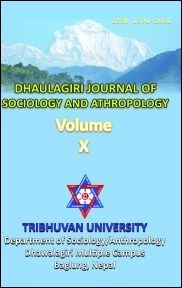The State of Food (In)Security in the Trans-Himalaya, Upper-Mustang, Nepal
DOI:
https://doi.org/10.3126/dsaj.v10i0.15882Keywords:
food security, HFIAS, Trans-Himalaya, Upper-Mustang, NepalAbstract
Food insecurity is a global issue, with higher prevalence of hunger in developing countries. Low crop yield and food production - due to difficult topography and traditional farming methods - combined with lower income; fluctuations in prices and supply, and low quality of food have been causing food insecurity in Nepal. This research examines food (in)security situation in Upper-Mustang, Nepal. The results are derived from the data collected through face–to-face interviews with the heads of 66 households, in-depth interviews conducted with 22 key informants, and discussions with the group of local people in different (6) places. The household food system was studied from livelihood perspectives and food (in)security was assessed in relation to self-sufficiency or production sufficiency, access, utilization, and stability of food. Households in the Trans-Himalaya acquire food from multiple sources such as farming and livestock ranching, buy food from the market, and also receive food aid for the sake of survival during the food crisis. Food security situation in terms of self-production in Upper-Mustang is at worst stage that many households are facing severe to chronic food insecurity. Studied households access marketed food, though the price they pay is very high. The worrisome issue is that there is no significant improvement in food security situation over time in the Trans-Himalaya. Study found that not the household size but dependency ratio in the household increases food insecurity. On the other hand, quality of farmland in terms of cropping intensity and availability of irrigation rather than the farm-plot size contribute for food security. The issue of food security is still a valid development policy goal for Nepal in general and for the Trans-Himalaya in particular. Accordingly, food security interventions are important. Yet, policy for interventions should look into all components of food systems, particularly providing irrigation, promoting local food varieties, and provisioning for food subsidies and food aid together with subsidies in food transport.




